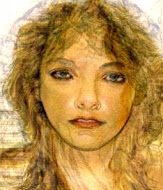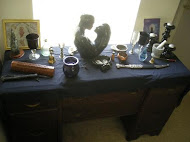This post is taken in entirety from The Element Encyclopedia of 5000 Spells by Judika Illes
According to the author, folklorist and scholar of magic, Zora Neale Hurston, "magic is older than writing. So nobody knows how it started." Very true, but what we do know is that magic comes from all over the globe. There is not a people or culture on Earth that did not at one time possess a magical tradition, whether they recall it today or whether or not they still use it. Some cultures and religions revel in their magical traditions. Others are ashamed of them or deny that the traditions ever existed. Some ethnic groups like to point the finger and suggest that magic comes from other people, not them, oh no, never - any practices of their own are only isolated bad habits picked up from disreputable magical wanderers or neighbors.
When a large cache of papyri from Alexandria in Egypt was found to be largely devoted to magic, scholars exulted. Not because they were neces-sarily so interested in magic, although some were, but because magic spells reveal a tremendous amount about a culture and its circumstances. Read between the lines of a spell and you will discover important details about people's expectations of life and death, their daily problems, the materials that they cherish, their spiritual outlook. For example, recently published books intended for the urban magical practitioner attempt to minimize or even eliminate the need for botanicals. Beyond their value to their intended audience, these books also transmit a crucial message to all of us regarding the state of our environment. As another example, only cultures that possess a belief in the possibility of legal justice, however remote, produce court case spells. Love spells reveal cultural sexual dynamics. So you see, magic spells have tremendous value as history, anthropology, and sociology way beyond their practical value to the spell- caster.
Translations of the Alexandrian papyri, now known as the Magical Papyri, were eagerly awaited. Stemming mainly from the second century BCE to the fifth century CE, they span a crucial, fascinating period of history: the times of Cleopatra, Jesus, the rise of Rome, the fall of Jerusalem, and the emergence of Christianity as a cohesive faith and world power.
Alexandria, although it became Egypt's capital, is not an ancient pharaonic city. It was founded by the Macedonian conqueror, Alexander the Great, one of several cities he named in his own honor. Its orientation is the Mediter-ranean, not the Nile, Like other older Egyptian cities. At various periods, indigenous Egyptians were not even permitted to live within Alexandria's boundaries. It was a Greek outpost in Egypt, with Greeks as the elite citi-zenry. Cleopatra, descendant of one of Alexander the Great's generals and the last of her dynasty, was the only one of her lineage who troubled to learn the Egyptian language.
The city achieved a reputation as a world-capital of magic. Alexandria supported a sizeable population of magic practitioners of all kinds - di-viners, dream interpreters, professional spell-casters - all presumably serving the needs of their specific communities rather than Alexandria as a whole, because Alexandria was a rigidly divided city. Although Alex-andria, like many cities of its time, was divided into quarters, true div-isions, like many a modern city, were cast along ethnic lines. Two of Alex-andria's quarters were Greek; one was Egyptian (the only area in which they were permitted to reside), and the fourth housed a sizeable Jewish community.
Divisions between the quarters were distinct, reflecting hostility between these communities, which periodically bubbled over into rioting and vio-lence. It was a turbulent, volatile city, demonstrating ethnic tensions only too familiar today. This may be ancient history but it's a familiar land-scape to many contemporary urban dwellers or anyone who reads a cur-rent newspaper. It was precisely the cities divisions and its multi-ethnic population and varied religious and spiritual traditions (Alexandria was also the birthplace of Gnosticism) that so excited the archeologists and scholars - it provided the potential for something like historical "control groups."
Expectation was that the orientation of the papyri would be largely Greek. In Athens, there was a tendency to associate magic with out-of-towners - Thracians or Thessalians. Would this practice continue? Would there be completely Greek magic, or would the Alexandrians transfer the outsider role to the native Egyptians? Would the Greeks, traditionally impressed by Egyptian mysticism (Pythagoras studied in Egypt) adopt some of their host country's practices? Would it be possible to clearly trace the emergence of Gnosticism as well as Pagan reactions to Christianity? Answers to these crucial questions were anticipated with baited breath as translation of the papyri progressed.
What was uncovered is a mess. The spells, on the whole, are neither clear-ly nor even mostly Greek, or Egyptian, or that third ethnic group, Judaic, but a scrambled jumble of all three, with a healthy dose of Pagan and Christian Gnosticism, together with a sprinkling of influences from other parts of the Greek and Roman empires. Any individual spell may incorp-orate the God of Israel, assorted angels, Egyptian gods, Mesopotamian gods, Greek gods, Nubian gods, Jesus Christ and Christian spirituality, bo-tanical magic, divination, names of mysterious things we have no way of presently identifying, some or all of the above, and definitely not neces-sarily in that order.
What was a poor scholar to do? How to interpret and sort this material, determine who wrote it, and to whom it truly belongs and applies?
None of the information in the papyri is mundane everyday material that you might say any individual on the street was bound to know. The spells and incantations are the height of occult knowledge. The Magical Papyri are the descendants of highly guarded spiritual secrets, the ancestors of high ritual magic. Alexandria was an intensely urban community. These spells don't reflect the knowledge common to any village wise-woman or cunning man but are highly detailed and specialized, occult in every sense, the stuff of initiates and adepts. Who wrote them? The information con-tained in them defies all attempts to pigeonhole these spells.
They derive from over centuries and so can't be attributed to one person, not even the legendary Hermes Trismegistus. Nothing in Alexandria's his-tory indicates a mingling of cultures that would provide a general inter-cultural exchange like this - quite the opposite. Furthermore, although Greek was Alexandria's lingua franca and many Jews, for instance, spoke that language rather than their own, spiritual secrets were still recorded in each community's distinct tongue. Sacred, secret spiritual texts in each possible tradition were maintained in the most obscure version possible specifically so that profane eyes could not access them. Egyptian, Greek, and Hebrew aren't even written with the same alphabets. Who had access to all this vast information? How was it transmitted?
Intense debate ensued regarding who compiled these spells and who act-ually cast them. Were they Greeks, as had originally been anticipated, or were they Egyptians? Were they Greeks gone native? Controlled attempts had been made to combine aspects of Greek and Egyptian religion, culmin-ating in the cult of Serapis. But then, why the Jewish reference? Were they Egyptians striving to Hellenize? But then why the Christian refer-ences? Maybe the spells were compiled by unemployed wizard-priests trying to find a new professional niche market, but then why don't they hew more faithfully to centuries of conservative Egyptian tradition? They couldn't be Jews, because, of course, Jews are monotheistic and don't participate in this kind of thing, but then, if not, how did the spell-casters learn all those obscure Hebrew names of power, names extremely difficult to access even within the Jewish community? But if they were Jews. what were they doing invoking Hecate, Hathor and Hermes? They couldn't be Christians because Christians forbade magic in general, because Alexandria was home to a particularly militant branch of Christianity and because the rift be-tween Christians and Pagans was especially violent and bitter in Alex-andria. But if they were not Christians, why all the references to Jesus Christ? These mysteries were not the ones that scholars had so eagerly anticipated investigating and debating.
Translation of the Magical Papyri occurred only recently. Perhaps more information will be uncovered. Volume one of The Greek Magical Papyri in Translation Including the Demotic Spells was first published in 1986. Egyptologists, anthropologists, historians, linguists, and other schol-ars continue to discuss their origin and broad scope. The only experts, I suspect, who have not been consulted are contemporary urban magical practitioners, for whom the entangled ethnic and spiritual roots of the Magical Papyri's spells would come as no surprise.
When historians counted Alexandria's four quarters, they neglected a fifth community, who quite obviously rejected, transcended, and ignored those boundaries: Alexandria's vast community of magical practitioners, a quar-ter unto themselves. Where other residents of Alexandria found divisions, these magical practitioners discovered a crossroads. Magic thrives where roads meet. What the Magical Papyri manifests is the birth of modern magic.
If you were an up-and-coming metaphysical seeker or magical practitioner back then, Alexandria was the place to go. Why? Not just to make money; you'd retain more of a monopoly by staying home as a big fish in small pond. No, you'd go to Alexandria to meet other practitioners, learn what they had to teach and share some secrets of your own. The spells of the Magical Papyri demonstrate what happens at those crossroads.
Where others obeyed the rules and kept to their own kind, magical practi-tioners went wandering, with magic as the lingua franca, the common tongue, exploring each other's secrets, deconstructing them and putting them back together in whole new confabulations. This mixing is not neces-sarily about improvement; spells that hew faithfully to one tradition work just as powerfully as blended spells. Instead it's about experimentation and the desire (common to all practitioners), to adapt something of power to one's own needs. (This process is not always a happy one. One person's sharing is another person's appropriation. The Egyptians, for example, were appalled when they learned that Greeks had discovered aphrodisiac properties in their sacred temple incense, kyphi.)
Alexandria presaged the modern city, filled with immigrants from Earth's different coroners. Previously, opportunities to meet other practitioners probably came from your own family; everyone shared the same knowledge and repertoire of tools and materials. Sure, there was the occasional wan-dering stranger, but nothing like the vast landscape of Alexandria, where practitioners from so many traditions could sit and share secrets. Magic, back then as it does today, transcends and defies boundaries of language, ethnicity, race, gender or religion to form its own community.
When I first read the Magical Papyri my immediate reaction was recog-nition: all those mixed-up, boundary-jumping spells resembled, in nature if not in specific detail, the culturally diverse magic that I learned in my own hometown, that crossroads of the modern world, New York City. New York, like Alexandria, has had its moments of tense ethnic division, but you wouldn't know it from the metaphysical community. Fearing the law, fearing ridicule, people may hold themselves aloof, at least until genuine magical credentials, knowledge, respect and curiosity are demonstrated, but then the walls come down.
One thing magical practitioners have in common all around the world is curiosity, the quest for knowledge. We are the original enquiring minds who wish to know. Obstacles to knowledge are bitterly resented and are persistently undermined. Magicians always wish to expand their power and increase their knowledge and repertoire. There is a reason that so many of the earliest books printed were grimoires, or books of magic - the same reason that Lord Thoth is patron both of scribes and magicians. Providing that a society is at all literate, magical practitioners, on the whole, are great readers, from ancient Egypt's Houses of Life to the Voodoo queens of New Orleans.
There is only one thing better than learning from a book and that's learn-ing from each other. Magical practitioners are, in general, an open-minded bunch. Put a few in a room together and fairly quickly tools will be com-pared, secrets shared, and demands for knowledge made.
Spells are constantly evolving to suit changing needs. This is particularly true where cultures live closely alongside each other. Nothing crosses bor-ders faster than a magic spell. For instance it can be almost impossible to separate totally the intermingled strands of various European magical traditions. Because certain methods, materials and styles are more popular and prevalent in one area than another doesn't necessarily mean that they originated there or, at least, not in isolation. Even the most sedentary, isolated communities received periodic magical cross-pollination from Jews, Romany, tinkers, and assorted wanderers.
These entwined traditions become even more complex in the magical and spiritual traditions of America and the Western Hemisphere.
During the height of the slave trade, people were kidnapped from, all over Africa. What were originally distinct cultures, each with specific spiritual and magical traditions, found themselves thrown together in dire circum-stances, the type of circumstances in which many reach for magic. In Haiti, the traditions of the Fon people of Dahomey were dominant and evolved into Vodoun, although not in isolation. These traditions evolved, adding components of indigenous Taino magic, diverse other African tra-ditions, French, and Spanish magic, thus also transmitting Basque, Jewish, Moorish, and Romany influences and last but not least, Freemasonry. You think this is beginning to make Alexandria look simple? Just wait.
Following later political turbulence, many Haitian refugees fled to New Orleans, where Vodoun evolved once more, retaining its frame but picking up new influences, this time from the local black population, whose own magic derived from Congolese sources rather than Fon, and also British, Italian and Native American magical traditions. New Orleans, the Crescent City, became known as the capital of American magic. Its traditions would soon be incorporated into what might be called mainstream magic, that magic most accessible to the population at large. This magic would eventu-ally be transmitted to Europe where, who knows? Maybe it's now been picked up by African emigrants to evolve and transform once more.
After extended contact, New Orleans Voodoo can be hard to distinguish from Hoodoo. Hoodoo's basic framework also derives from Africa, mainly from Congolese traditions, but again not in isolation. Deprived of the botanicals with which they had been familiar in Africa, their materia magica, enslaved African magical practitioners consulted with Native American and acquired a whole new botanical tradition, sharing magical and spiritual secrets as well. These Hoodoo doctors typify the proverbial questing, intellectually curious magicians. In addition to Native American, West and Central African roots, their tradition soon incorporated European folk magic, the Egyptian mysteries, Freemasonry and Kabbalah. The great grimoires became available to all. Transmission was cross-cultural. With the exception of a very few isolated mountain pockets, American magic in general demonstrates tremendous African influence.
Further north, Pow-Wow is the magic of German immigrants to Pennsyl-vania, the Pennsylvania Dutch (a corruption of Deutsch.) The basic frame-work is, of course, the German magic the migrants carried with them, both high ritual and folk magic, which incorporated a healthy dose of Jewish and Romany influence as well as those of neighboring European people. In America, strong further influence (and the tradition's name) came from Native Americans, especially the Iroquois, and from the Chikkeners, the so-called Black Dutch: Romany (Zigeuners) forcibly de-ported from Europe who, separated from clan and family, found discreet safety among the Pow-Wow artists.
In 1819 or 1820, dates vary, Pow-Wow artist and hexenmeister, John George Hohman compiled a canon of Pow-Wow wisdom and published it under the title The Book of Pow-Wows: The Long Lost Friend. This book, still in print, traveled to the cities of the South, carried largely by Jewish merchants, who sold it to Voodoo and Hoodoo practitioners, who incorporated it into their already multi-cultural blend of magic and, no doubt, sent some equally valuable information up North with the returning merchant, who were learning from everybody and spreading the news.
There is an important exception to this magic melting pot, of course. Very isolated areas, places where people have historically had little or no con-tact with others, maintain extremely pristine, ancient magical traditions. Like the unique creatures of the Galapagos Islands, their traditions devel-oped in isolation and thus may have very unique, easily identifiable char-acteristics. It's much easier to clearly identify a spell from Papua New Guinea, for instance, than it is to distinguish between French, German, or Swiss spells. Because these traditions are so unique and because one can identify the spells origins, it's very tempting to constantly point out which spell came from which isolated culture. The danger is that this creates a lopsided effect, akin to those old-school anthropologists who were so quick to note the curious habits of the "Natives" while failing to remark on sim-ilar practices, parallels and traditions back home.
I can't emphasize more that every distinct people, every culture, every na-tion, every religion and spiritual tradition has, at one time or another, incorporated, developed, and created magic spells. Each one of us has a ma-gical history somewhere along the line. Loss and abandonment of these traditions tends to accompany loss of cultural or religious autonomy. These spells, therefore, are our shared human heritage, not isolated odd things engaged in only by strange other people, very different from us.
In some cases, in this book, I have pointed out where spells come from and which traditions they represent, especially if there's some interesting factoid associated with it or if that knowledge may help you cast the spell, or sometimes just to give credit where credit is due for a partic-ularly beautiful spell. However, I have not done so in every case. Some-times I did not wish to keep emphasizing one culture, as if they were Earth's only magical ones, especially those cultures whose vast magical repertoire has stimulated others to vilify, stereotype and persecute them. In other cases, the roots were too tangled to identify their origins honestly.
Although many of the spells in this book are meant for use, others are included purely for historic value and perspective, so that we may remember and learn from them.
Taken in entirety from The Element Encyclopedia of 5000 Spells by Judika Illes
Disclaimer: No one involved in this blog or its contents may be held responsible for any adverse reactions arising from following any of the instructions/recipes on this list. It is the reader's personal responsibility to exercise all precautions and use his or her own discretion if following any instructions or advice from this blog.















No comments:
Post a Comment